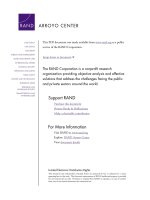Options for U.S. Health System Reform- A Critical Analysis
Bạn đang xem bản rút gọn của tài liệu. Xem và tải ngay bản đầy đủ của tài liệu tại đây (346.23 KB, 2 trang )
Illinois Wesleyan University
Digital Commons @ IWU
John Wesley Powell Student Research
Conference
1992, 3rd Annual JWP Conference
Apr 25th, 10:30 AM - 2:30 PM
Options for U.S. Health System Reform: A Critical Analysis
Andrea Stenger
Illinois Wesleyan University
Teodora Amoloza, Faculty Advisor
Illinois Wesleyan University
Follow this and additional works at: />
Stenger, Andrea and Amoloza, Faculty Advisor, Teodora, "Options for U.S. Health System
Reform: A Critical Analysis" (1992). John Wesley Powell Student Research Conference. 13.
/>
This is protected by copyright and/or related rights. It has been brought to you by Digital Commons
@ IWU with permission from the rights-holder(s). You are free to use this material in any way that
is permitted by the copyright and related rights legislation that applies to your use. For other uses
you need to obtain permission from the rights-holder(s) directly, unless additional rights are
indicated by a Creative Commons license in the record and/ or on the work itself. This material has
been accepted for inclusion by faculty at Illinois Wesleyan University. For more information, please
contact
©Copyright is owned by the author of this document.
OPTIONS FOR U.S. HEALTH SYSTEM REFORM: A CRITICAL ANALYSIS
Andrea Stenger, Dept of Sociology and Anthropology, IWU
Teodora Amoloza*
This research examines the options for American health policy and health system reform.
The United States market-based health care system, involving over 1500 private insurance
companies, is failing. Fewer and fewer Americans are able to afford insurance and the overall
cost of the system has increased at a rate well beyond the national inflationary rate. As a result,
health care .in the United States has become a privilege for those able to pay. Primary objectives
for reform, then, include universal access and cost-containment. The three most common types
of proposals for reform include 1) tax reform proposals, 2) pay-or-play proposals, and 3) national
health insurance proposals. This study compares each proposal type using key indicators,
including their effect on private insurance, health care providers, businesses and consumers.
Emphasis is placed on America's historic reluctance to enact national health insurance, despite
its advantages for universal access and cost-containment.









